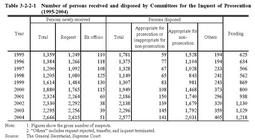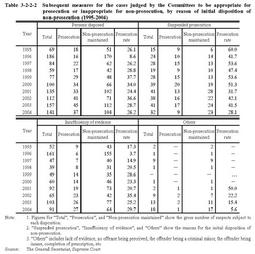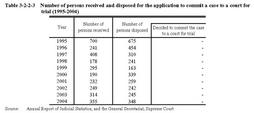| Previous Next Index Image Index Year Selection | |
|
|
3 Relief measures against non-prosecution The right to prosecute is exclusively granted to public prosecutors.Public prosecutors are also granted broad discretion upon prosecution.However,a public prosecutor may misjudge a case and make a decision of non-prosecution against a suspect who should be prosecuted.For this reason,legal procedures have been established for the relief of complainants,victims and others against the disposition of non-prosecution by a public prosecutor.Under this system,complainants,victims and others have the right to request reviews by the Committees for the Inquest of Prosecution and the right to file applications for committing a case to a competent district court for trial(also called the quasi-prosecution procedure).
(1) Request for reviews by Committee for the Inquest of Prosecution A total of201Committees for the Inquest of Prosecution are established nationwide,each with11members chosen by lot from the electoral roll for a term of six months.By request or ex officio,a Committee reviews the disposition of non-prosecution made by a public prosecutor and make a judgment of the case being"appropriate for prosecution","inappropriate for non-prosecution"or"appropriate for non-prosecution".Those qualified to make such a request are complainants,accusers,claimants and victims(the spouse,linear relatives or siblings are eligible to make such a request if the victim is dead).Applicants for review may submit written opinions or related documents to the Committees.
Furthermore,the Law for Partial Amendment to the Code of Criminal Procedure etc.(Law No.62of2004)partially amended the Law for the Inquest of Prosecution(to be enforced on the day specified by a cabinet ordinance no later than five years from the date of promulgation).This amendment sets forth that if the public prosecutor maintains the disposition of non-prosecution after a Committee judges the case to be"appropriate for prosecution,"the Committee may review the disposition once again and may judge that the case is appropriate for prosecution.When this judgment is made,the attorney at law who has been specified by the court institutes public prosecution and sustains it. Table3-2-2-1 shows the number of persons received and disposed by the Committees over the last10years. Table3-2-2-1 Number of persons received and disposed by Committees for the Inquest of Prosecution(1995-2004) In2004,the Committees newly received2,340persons for penal code offenses.By type of offense,the greatest number of them(563persons)were received for professional negligence resulting in death or injury,followed by353persons for counterfeit of various documents,310for abuse of authority,219for injury or injury resulting in death,and168for fraud.In contrast,326persons were newly received for special law offenses.The greatest number of them(66persons)were received for violations of the Public Offices Election Law(Source:The General Secretariat,Supreme Court).Table3-2-2-2 shows subsequent measures taken by public prosecutors for the cases judged by the Committee to be appropriate for prosecution or inappropriate for non-prosecution,by reason of initial disposition of non-prosecution,over the last10years. Table3-2-2-2 Subsequent measures for the cases judged by the Committees to be appropriate for prosecution or inappropriate for non-prosecution,by reason of initial disposition of non-prosecution(1995-2004) In total,142,974persons were disposed by the Committees between1949(when the Law for the Inquest of Prosecution took effect)and2004,including16,791persons judged to be appropriate for prosecution or inappropriate for non-prosecution.Among them,prosecution was instituted for1,267persons,and1,116were convicted(384sentenced to imprisonment and732to fine)and76were found not guilty(including dismissal for judicial bar and dismissal of prosecution)(Source:The General Secretariat,Supreme Court).(2) Application to commit a case to a court for trial Application to commit a case to a court for trial is the system which allows complainants or accusers,who have an objection to a public prosecutor's disposition of non-prosecution for various types of abuse of authority,to request to commit a case to a district court for trial.
When there seems to exist a reason for such request,the district courts makes a determination to commit the case to a trial.Due to such determination,a public prosecution is deemed to be raised,and the court designates a person who maintains the public prosecution among the lawyers,and has him perform the duties of a prosecutor. Table3-2-2-3 shows the number of persons received and disposed for the application to commit a case to a court for trial over the last10years. Table3-2-2-3 Number of persons received and disposed for the application to commit a case to a court for trial(1995-2004) (3) Others There is also a non-legal system for relief whereby victims or others may appeal against the disposition of non-prosecution by public prosecutors.They may request the chief prosecutor of a higher public prosecutors office to exercise the power of supervision.Upon receiving such complaints,the higher public prosecutors office reviews the disposition and notifies the complainant of the results of the review.
|


